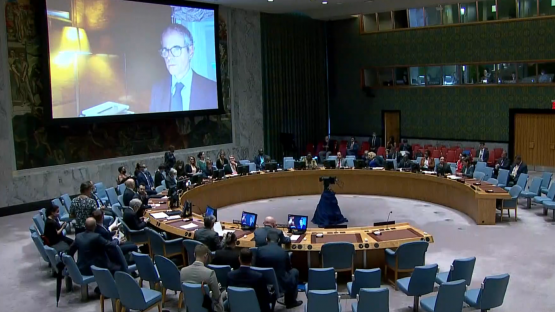The establishment of a Nuclear Safety and Security Protection Zone at the Zaporizhzhya Nuclear Power Plant (NPP) in Ukraine is urgently needed to ensure that the physical integrity of the plant is not compromised, Director General Rafael Mariano Grossi told the UN Security Council yesterday. Zaporizhzya NPP has been controlled by Russian forces since March but is operated by its Ukrainian staff.
In a session discussing threats to international peace and security, Mr Grossi outlined findings and recommendations from the IAEA Support and Assistance Mission to Zaporizhzhya (ISAMZ), released on Tuesday in its Nuclear Safety, Security and Safeguards in Ukraine: 2nd Summary Report.
Stressing the need for a protection zone, including an end to the shelling around the plant, he explained that the first important safety pillar that exists in any nuclear facility is not to violate its physical integrity. Mr Grossi said that unfortunately "this has happened and this continues to happen,” adding that “we are playing with fire and something very catastrophic could take place.”
Mr Grossi told the Security Council that the IAEA through ISAMZ now has a continuous presence at Zaporizhzya NPP, with personnel on the ground at the plant providing first-hand neutral, impartial and technical information on the site’s status. Pointing out the value of the Agency’s continued presence at the plant, he said this provided the IAEA, and through it, the United Nations and the international community with the capacity to have a direct, immediate evaluation of the situation on the ground as it may happen.
“This fact is unprecedented,” Mr Grossi said, stating that historically IAEA inspectors became involved after the facts in order to remediate something that had already happened. “We in this case have the historical, ethical imperative to prevent something from happening,” he said.
“We can agree on a very simple, but incredibly necessary protective mechanism to avoid what is happening now, as we speak, which is the shelling of a nuclear power plant. Let’s seize this opportunity so fundamental for peace, for security and to protect the populations of Ukraine and beyond,” he added.
We can agree on a very simple, but incredibly necessary protective mechanism to avoid what is happening now, which is the shelling of a nuclear power plant. Let’s seize this opportunity so fundamental for peace, for security and to protect the populations of Ukraine and beyond.







